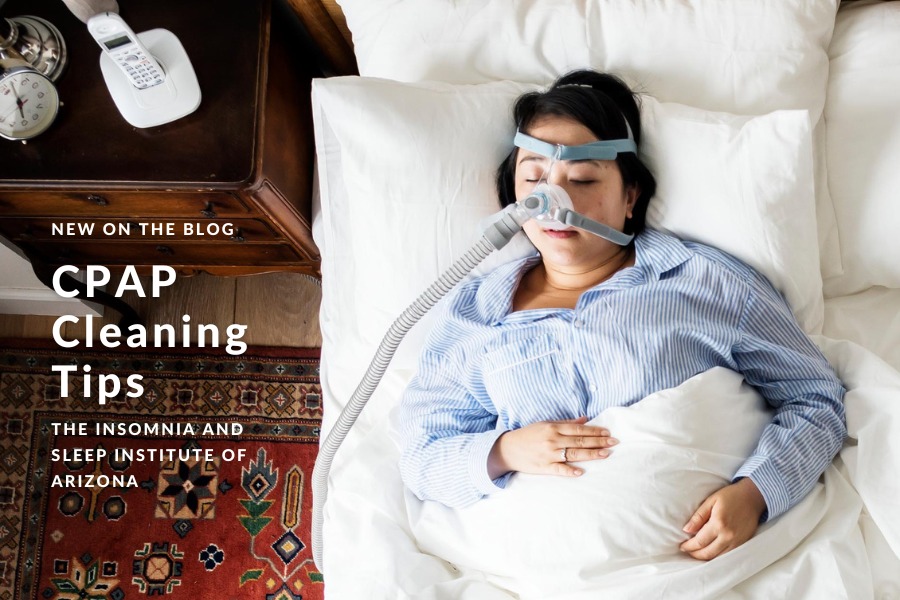CPAP therapy is the gold standard treatment for obstructive sleep apnea (OSA), the most common type of sleep apnea. However, adherence can be a challenge for some patients—which is why, at The Insomnia and Sleep Institute of Arizona, we work closely with patients to make sure they are matched with the best CPAP technology for them. Adherence is critical not only to success, but in making sure your insurance policy covers the treatment (if applicable). One of the reasons people may not adhere to their Phoenix CPAP treatment plan is because they are not cleaning their machine and accessories as they should. Cleaning instructions should be provided and explained if you work with a reputable sleep expert at the start of your therapy—but what if you need a refresher course?
Cleaning is essential to ensuring that contaminants don’t grow inside your equipment. In some cases, if it isn’t cleaned routinely or correctly, germs might make their way into your body. Alternatively, dust and debris can cause mechanical issues that might not be noticed right away. The good news is that cleaning your CPAP doesn’t need to be a big ordeal. Here are five easy steps to handle it.
Every CPAP Tech is Unique
There are many options when it comes to both CPAP machines and accessories. Always follow the manufacturer’s cleaning instructions. You may find there are similarities between these instructions, especially if you have more than one machine (i.e. one for home and one for travel), but subtle differences are still likely to be present. There are general best practices for cleaning these machines, but don’t forget to check and revisit the directions exclusively for your tech.
The directions may include which cleaners to use. However, if that isn’t the case, try to avoid cleaners that contain UV lights or ozone gas. Ozone gas is also sometimes called activated oxygen. You’ll find plenty of so-called CPAP cleaners with these ingredients because it makes it seem like it’s easier—but putting in a little effort is better. The FDA doesn’t recommend either of these cleaners and have not approved them. UV lights can harm your skin and eyes while ozone cleaners have been shown to cause respiratory problems in some people. Plus, in some cases, using these cleaners might void the warranty on your Phoenix CPAP machine.
Water Matters
Only distilled water should be used for CPAP machines that have humidifiers. Distilled water is different because it has less minerals, which means less buildup will occur in the water chamber of your machine. Ultimately, this is going to mean less cleaning in the future and a lower chance of mold occurring. Get into the habit of adding distilled water to your shopping list and don’t be tempted to cut corners with tap water.
Ideally, a CPAP machine should be cleaned every morning. This means wiping down the water chamber and mask with a clean cloth and soapy water. You may be able to use wipes that are specially designed for CPAP machines or even baby wipes depending on the manufacturer’s instructions. Humidifiers should have the water dumped out so they can air dry through the day. Masks should be disassembled, wiped down, and hoses rinsed. You may want to hang the hose to dry it quicker. Masks with memory foam should not have water applied in these areas. Avoid getting water in the machine itself—a quick wipe-down with a damp clean cloth is enough.
CPAP Care
Finally, remember to replace parts as recommended. Cleaning and replacement are the key to the easy maintenance of your CPAP machine. The better you care for it, the longer it will last and the better it will serve you. Also bear in mind that lifestyle changes can also help reduce your OSA symptoms. For instance, those who carry extra weight may be able to reduce their OSA symptoms or eliminate it entirely with fat loss. Avoiding alcohol and heavy meals before bed is also recommended. OSA can be a chronic condition, but with a little planning—and proper CPAP maintenance—it can also be a manageable disease. To find out more about CPAP therapy, Inspire implant for OSA, or more help with your sleep apnea, contact The Insomnia and Sleep Institute today. Call the clinic during business hours or fill out the online contact form for the fastest response.





